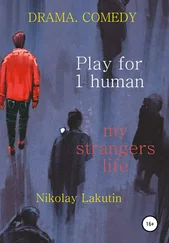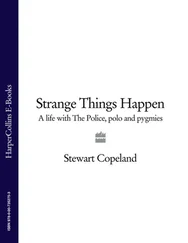Douglas Hofstadter - I Am a Strange Loop
Здесь есть возможность читать онлайн «Douglas Hofstadter - I Am a Strange Loop» весь текст электронной книги совершенно бесплатно (целиком полную версию без сокращений). В некоторых случаях можно слушать аудио, скачать через торрент в формате fb2 и присутствует краткое содержание. Жанр: Прочая документальная литература, на английском языке. Описание произведения, (предисловие) а так же отзывы посетителей доступны на портале библиотеки ЛибКат.
- Название:I Am a Strange Loop
- Автор:
- Жанр:
- Год:неизвестен
- ISBN:нет данных
- Рейтинг книги:4 / 5. Голосов: 1
-
Избранное:Добавить в избранное
- Отзывы:
-
Ваша оценка:
- 80
- 1
- 2
- 3
- 4
- 5
I Am a Strange Loop: краткое содержание, описание и аннотация
Предлагаем к чтению аннотацию, описание, краткое содержание или предисловие (зависит от того, что написал сам автор книги «I Am a Strange Loop»). Если вы не нашли необходимую информацию о книге — напишите в комментариях, мы постараемся отыскать её.
I Am a Strange Loop — читать онлайн бесплатно полную книгу (весь текст) целиком
Ниже представлен текст книги, разбитый по страницам. Система сохранения места последней прочитанной страницы, позволяет с удобством читать онлайн бесплатно книгу «I Am a Strange Loop», без необходимости каждый раз заново искать на чём Вы остановились. Поставьте закладку, и сможете в любой момент перейти на страницу, на которой закончили чтение.
Интервал:
Закладка:
SL #642: Naïve ?! I notice that you haven’t stopped saying “I”! You’ve probably said it a hundred times in the last five minutes!
SL #641: To be sure. You’re absolutely right. This “I” is a necessary, indispensable concept to all of us, even if it’s an illusion, like thinking that the sun is circling the earth because it rises, moves across the sky, and sets. It’s only when our naïve viewpoint about “I” bangs up against the world of physics that it runs into all sorts of difficulties. It’s at that point that those of us who are scientifically inclined realize that there has to be some other story to be told about it. But believing in the easy story about “I” is a million times more important to most of us than figuring out a scientific explanation for “I”, so the upshot is that there’s no contest. The “I” myth wins hands down, without a debate ever taking place — even in the minds of the majority of scientifically inclined people!
SL #642: How can that be?
SL #641: I surmise it’s for two reasons. One is that the “I” myth is infinitely more central to our belief systems than is the “sun circling the earth” myth, and the other is that any scientific alternative to it is far subtler and more disorienting than the shift to heliocentrism was. And so the “I” myth is much harder to dislodge from our minds than the “sun circling the earth” myth. Deconstructing the “I” holds about as much appeal for a typical adult as deconstructing Santa Claus would hold for a typical toddler. Actually, giving up Santa Claus is trivial compared to giving up “I”. Ceasing to believe altogether in the “I” is in fact impossible, because it is indispensable for survival. Like it or not, we humans are stuck for good with this myth.
.SL #642: Why do you keep on saying the “I” is just a myth or a hallucination or an illusion, just like that blasted non-marble? I’m tired of your trotting out your tired old marble metaphor. I want to know what’s hallucinated.
SL #641: All right, let’s put the marble metaphor to bed for a while. The basic idea is that the dance of symbols in a brain is itself perceived by symbols, and that step extends the dance, and so round and round it goes. That, in a nutshell, is what consciousness is. But if you recall, symbols are simply large phenomena made out of nonsymbolic neural activity, so you can shift viewpoint and get rid of the language of symbols entirely, in which case the “I” disintegrates. It just poofs out of existence, so there’s no room left for downward causality.
SL #642: What does that mean, more specifically?
SL #641: It means that in the new picture there are no desires, beliefs, character traits, senses of humor, ideas, memories, or anything mentalistic; just itty-bitty physical events (particle collisions, in essence) are left. One can do likewise in the careenium, where you can shift points of view, either looking at things at the level of simmballs or looking at things at the level of simms. At the former level, the simms are totally unseen, and at the latter level, the simmballs are totally unseen. These rival viewpoints really are extreme opposites, like the heliocentric and geocentric views.
SL #642: All of this I see, but why do you keep implying that one of these views is an illusion, and the other one is the truth? You always give primacy to the particle viewpoint, the lower-level microscopic viewpoint. Why are you so prejudiced? Why don’t you simply see two equally good rival views that we can oscillate between as we find appropriate, in somewhat the way that physicists can oscillate between thermodynamics and statistical mechanics when they deal with gases?
SL #641: Because, most unfortunately, the non-particle view involves several types of magical thinking. It entails making a division of the world into two radically different kinds of entities (experiencers and non-experiencers), it involves two radically different kinds of causality (downward and upward), it involves immaterial souls that pop into being out of nowhere and at some point are suddenly extinguished, and on and on.
SL #642: You are so bloody inconsistent! You liked the explanation of the falling domino that invoked the primeness of 641! You preferred it! You kept on saying it was the real reason the domino didn’t fall, and that the other explanation was myopic and hopelessly useless.
SL #641: Touché! I admit that my stance has a definite ironic tinge to it. Sometimes the strict scientific viewpoint is hopelessly useless, even if it’s correct. That’s a dilemma. As I said, the human condition is, by its very nature, one of believing in a myth. And we’re permanently trapped in that condition, which makes life rather interesting.
SL #642: Taoism and Zen long ago sensed this paradoxical state of affairs and made it a point to try to dismantle or deconstruct or simply get rid of the “I”.
SL #641: That sounds like a noble goal, but it’s doomed to failure. Just as we need our eyes in order to see, we need our “I” ’s in order to be ! We humans are beings whose fate it is to be able to perceive abstractions, and to be driven to do so. We are beings that spend their lives sorting the world into an ever-growing hierarchy of patterns, all represented by symbols in our brains. We constantly come up with new symbols by putting together previous symbols in new kinds of structures, nearly ad infinitum. Moreover, being macroscopic, we can’t see way down to the level where physical causality happens, so in compensation, we find all sorts of marvelously efficient shorthand ways of describing what goes on, because the world, though it’s pretty crazy and chaotic, is nonetheless filled with regularities that can be counted on most of the time.
SL #642: What kinds of regularities are you talking about?
SL #641: Oh, for example, swings on a playground will swing in a very predictable way when you push them, even though the detailed motions of their chains and seats are way beyond our ability to predict. But we don’t care in the least about that level of detail. We feel we know extremely well how swings move. Similarly, shopping carts go pretty much where you want them to when you push them, even if their wobbly wheels, rather predictably, lend them an amusing trace of unpredictability. And someone ambling down the sidewalk in your direction may make some slightly unpredictable motions, but you can count on them not turning into a giant and gobbling you up. These sorts of regularity are what we all know intimately and take for granted, and they are amazingly remote from the level of particle collisions. The most efficient and irresistible shorthand of all is that of imputing abstract desires and beliefs to certain “privileged” entities (those with minds — animals and people), and of wrapping all of those things together in one single, supposedly indivisible unity that represents the “central essence” of such an entity.
SL #642: You mean that entity’s “soul”?
SL #641: Pretty much. Or if you don’t want to use that word, then it’s the way that you presume that that thing feels inside — its inner viewpoint, let’s say. And then, to cap it all off, since each perceiver is always swimming in its own activities and their countless consequences, it can’t keep itself from fabricating a particularly intricate tale about its own soul, its own central essence. That tale is no different in kind from the tales it makes up for the other mind-owning entities that it sees — it’s just far more detailed. Moreover, the story of an “I” is a tale about a central essence that never disappears from view (in contrast to “you” ’s and “she” ’s and “he” ’s, which tend to come into view for a scene or two and then go off stage).
Читать дальшеИнтервал:
Закладка:
Похожие книги на «I Am a Strange Loop»
Представляем Вашему вниманию похожие книги на «I Am a Strange Loop» списком для выбора. Мы отобрали схожую по названию и смыслу литературу в надежде предоставить читателям больше вариантов отыскать новые, интересные, ещё непрочитанные произведения.
Обсуждение, отзывы о книге «I Am a Strange Loop» и просто собственные мнения читателей. Оставьте ваши комментарии, напишите, что Вы думаете о произведении, его смысле или главных героях. Укажите что конкретно понравилось, а что нет, и почему Вы так считаете.












